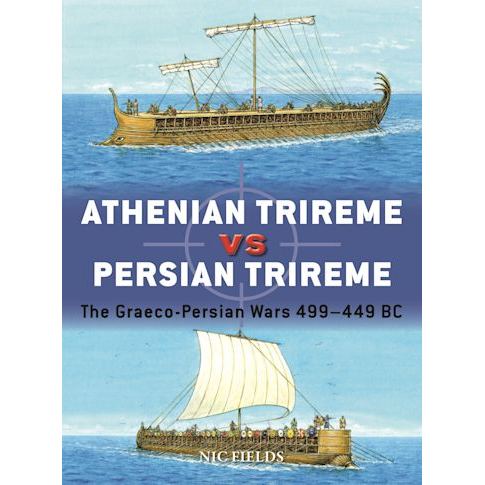GamesandStuff.com
ATHENIAN VS PERSIAN TRIREME
ATHENIAN VS PERSIAN TRIREME
Regular price
$22.00 USD
Regular price
Sale price
$22.00 USD
Unit price
per
Shipping calculated at checkout.
Couldn't load pickup availability
Earn 110 Points when you buy this item.
A fascinating and detailed exploration of one of the most famous warships of the Ancient world - the trireme - and its tactical employment by the opposing sides in the 5th-century BC Graeco-Persian Wars.
You may be familiar with the Athenian trireme – but how much do you know about the ram-armed, triple-oared warships that it dueled against at the battles of Artemision, Salamis and the Eurymedon River? How similar or different were these warships to each other? And why did the Persians rely on Phoenician vessels to form much of their navy?
Much attention has been devoted to the Greek trireme, made famous by modern reconstruction – with only passing notice given to the opposing Persian navy's vessels in illustrated treatments. Join us on the Aegean as, for the first time, we reveal a rarely attempted colour reconstruction of a trireme in Persian service.
Compare the form, construction, design, maneuverability, and tactical deployment of the opposing triremes, aided by stunning illustrations. Man the decks of these warships with the fighting complement of Greek citizen hoplites, Scythian archers and Persian marines, and learn why the Greeks placed a bounty of 10,000 drachmae on the head of Artemisia – the Karian queen and Persian admiral, and the only woman among Xerxes' commanders.
You may be familiar with the Athenian trireme – but how much do you know about the ram-armed, triple-oared warships that it dueled against at the battles of Artemision, Salamis and the Eurymedon River? How similar or different were these warships to each other? And why did the Persians rely on Phoenician vessels to form much of their navy?
Much attention has been devoted to the Greek trireme, made famous by modern reconstruction – with only passing notice given to the opposing Persian navy's vessels in illustrated treatments. Join us on the Aegean as, for the first time, we reveal a rarely attempted colour reconstruction of a trireme in Persian service.
Compare the form, construction, design, maneuverability, and tactical deployment of the opposing triremes, aided by stunning illustrations. Man the decks of these warships with the fighting complement of Greek citizen hoplites, Scythian archers and Persian marines, and learn why the Greeks placed a bounty of 10,000 drachmae on the head of Artemisia – the Karian queen and Persian admiral, and the only woman among Xerxes' commanders.


